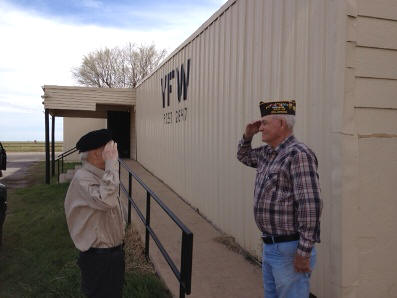|
Alva
April 8 2013
Dearest Old Bolds, Friends, and Family,
On Friday, we had another training day in Oklahoma City. During the
training, I introduced Charley, creating a ripple of murmurs
throughout the audience, as it had in Little Rock. Charley is
definitely enjoying Rock Star status this entire trip, as everyone
knows and is in awe of Africa Corps and Rommel.
As in Little Rock, where our police guys were eager to meet Charley
and have their pictures taken with him, one of our law enforcement
participants came to Charley, who was sitting with me in the back,
and shook his hand. He added, "Thank you for serving your country."
He had no idea how that one sentence could affect Charley, who could
not contain his deep emotion.
It's important to explain that as impossible as it is for us to
imagine, Charley had never heard anyone in Germany in the last 70
years say that to him. And now, the people of his former enemy were
showing him the honor and respect he does not receive at home.
As Americans, it is very difficult for us to understand the type of
pain German WW2 veterans endure every day. Germans can't really
understand our devotion to our veterans (and those former enemies
who honorably served their own countries). Not until they experience
it first hand.
Charley, and all WW2 veterans in Germany, suffer greatly from a
population that does not want to hear their stories, does not honor
their service, and who sometimes call them murderers and physically
attack them. Perhaps our Vietnam veterans understand best.
But while every year Vietman veterans have experienced improvement
in their status in the US, and Americans realize that no matter how
one feels about the wars in Iraq and Afghanistan, we all support our
troops, things in Germany continue to deteriorate for WW2 veterans
year after year. Even the Knight's Cross (US equiv. - Medal of
Honor) association is not allowed to mix with active duty servicemen
in the Bundeswehr and struggles to find a hotel to host them every
year. The hotels fear protestors may come and throw rocks through
their windows and otherwise damage their premises or reputation, and
sometimes under pressure or threat cancel days before a reunion
takes place.
The national tank reunion I attend in Germany every year takes place
on an army base, I'm sure at least partly, if not wholly, to keep
these 90+-year-old men safe while they honor their fallen comrades.
Here, Charley is overwhelmed by media eager to hear his story. He
has people who want to shake his hand, have his autograph or their
picture with him or hug him. People have offered to adopt him. And
he's experienced Americans - men and women - who cry with him when
they hear how German veterans are treated in their own country. This
usually causes a chain reaction, and I find myself amidst a whole
crowd of weeping people.
On Saturday, we drove with George Cone (our Dallas historian
extraordinaire friend) to Alva, Oklahoma, the most famous (or
infamous) POW camp in the US, where Charley resided in 1943-44.
There I had to keep feeding Charley snacks for lunch because none of
the museum staff, reporters, or locals wanted to let him out of
their sight for a minute (I'm starting realize I need to always have
food and water on hand for him for this reason).
After answering questions at the museum, and finding a picture of an
old friend in Africa uniform hanging amidst dozens of prisoner
photos on the wall, we drove to the site of the camp, where the last
remaining building now fittingly serves as a Veterans of Foreign
Wars clubhouse.
We were met there by the head of the VFW, a Sherman tank veteran of
Korea. As we looked around the site and over the land where the camp
once stood, these combat veterans quickly bonded. At the end of our
visit, both men saluted each other with deep honor and respect as
shutters clicked from every direction. There was not a dry eye to be
found.
I was hoping Charley would take a break to rest that evening. But
after hearing there was a college bull-riding competition at the
fairgrounds on
the site of his former camp, we found ourselves back in the thick of
the action in a packed viewing stand that night.
At our Bed and Breakfast in the morning, our hostess was amazed by
Charley. Her 14-year-old son and his friend begged Charley to
stay and go to school with them, where they wanted him to set up a
chair and have him speak to the school the entire day.
After an emotional goodbye, we ventured back to Oklahoma City, where
we stopped at the airport where the Collings Foundation WW2 bombers
and fighters were flying for the weekend. As a WW2 veteran, Charley
was waved through without paying, and George and I, his entourage,
were allowed to accompany him.
Everywhere we turned we were deluged by people eager to meet him,
shake his hand, and hug him. They wanted his autograph. They wanted
him in a picture with their young children. Some burst into tears
when he was overwhelmed by their respect, admiration, and affection.
I thought this trip was about research for a book on Charley. But
that's only half true.
More importantly, this has turned out to be Charley's Honor Flight.
The one that helps heal his soul and soften the bitter pill of daily
degradation that he must bear at home.
From a hotel in Dallas, where I sit in amazement of it all,
Heather

<Begin
Next> |